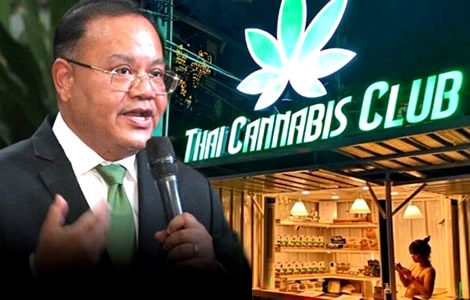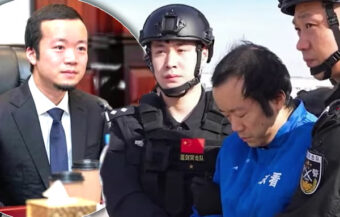Thai cannabis entrepreneur Tom Kreusophon embraces new health ministry regulations, highlighting trained budtenders, licensed dispensaries, telemedicine support and strict oversight that transforms the market into a safe, regulated and profitable medical cannabis industry going forward.
Thai cannabis entrepreneur Tom Kreusophon calls the Pheu Thai government’s new marijuana rules a major opportunity, not a threat. He says trained ‘budtenders’ and licensed dispensaries can now operate under full medical supervision, protecting patients and legitimising the market. The system, built on the June 2022 free-for-all and now new regulations, ends the chaos of casual highs and uncontrolled proliferation that forced government intervention. Kreusophon warns that operators ignoring medical standards will face enforcement, while compliant businesses are poised to thrive. Medical cannabis is now a serious business.

Chulaphas Kreusophon, widely known as “Tom Kreusophon,” is a leading figure in Thailand’s cannabis industry. He is the founder of Golden Triangle Health Co., Ltd. (GTH), a company at the forefront of medical cannabis development. This week, Mr. Kreusophon issued statements emphasising the readiness of Thailand’s cannabis sector to embrace the Ministry of Public Health’s new regulations. He stressed that the industry is not only prepared to adapt but also to thrive under the legal framework.
Mr. Kreusophon specifically highlighted the emerging role of “budtenders,” medical assistants who will operate in dispensaries and wellness centres. These trained professionals are designed to support patients safely while expanding small business opportunities.
Budtenders are central to Thailand’s medical cannabis rollout, supporting patients and creating jobs
Furthermore, he underlined the importance of integrating telemedicine into medical cannabis distribution, ensuring patients can access treatments efficiently. According to Mr. Kreusophon, the cannabis sector is currently adjusting its business model to align with government regulations.
In addition, he noted that clinics, dispensaries, and wellness centres across Thailand are already restructuring operations to meet legal standards. He emphasised that this adaptation is crucial to creating a market offering that will both work for patients and comply with the law.
The Department of Thai Traditional and Alternative Medicine has identified multiple medical needs that medical cannabis can address. For instance, sleep insomnia is a widespread issue in Thailand. Moreover, cannabis shows potential for treating chronic pain, migraines, Parkinson’s disease and anorexia. Mr. Kreusophon emphasised that proper training and oversight are essential to ensure patients receive safe and effective treatment.
Since June 2022, the cannabis sector has evolved significantly. Initially, many operators struggled to meet regulatory requirements, and several even abandoned operations. However, Mr. Kreusophon explained that today the industry has clarity.
Thailand’s cannabis industry has matured since June 2022, providing legal clarity and clear pathways
Legal pathways exist, and operators adhering to certification and training now have strong opportunities to succeed. In contrast, those pursuing cannabis solely for recreational use continue to face legal risks and industry disapproval.
Mr. Kreusophon emphasised that political affiliation does not define cannabis policy. Whether the Ministry of Public Health is led by the Pheu Thai Party under Minister Somsak Thepsutin or the Bhumjaithai Party under Anutin Charnvirakul, medical cannabis policy remains consistent. Therefore, entrepreneurs can rely on continuity and stability.
Furthermore, he noted that both major parties have historically supported medical cannabis, reflecting a shared vision for legalisation.
He also addressed past legislative obstacles. Previously, the Democrat Party blocked bills to legalise medical cannabis and establish clear regulations. Consequently, the lack of legal clarity hindered operators and patients alike. However, the current law has resolved these issues, ensuring that medical cannabis can now be safely prescribed and distributed.
Both major political parties support medical cannabis, ensuring continuity and stable industry regulation
The Ministry of Public Health has restricted legal cannabis use to five medical conditions. Patients may only use cannabis buds for insomnia, chronic pain, migraines, Parkinson’s disease and anorexia.
In addition, each patient must obtain a prescription from an accredited doctor or pharmacist. Prescriptions cover treatment for a maximum of 30 days. Cannabis may only be purchased in licensed shops sourcing product from certified farms. Furthermore, advertising, online sales and vending machine distribution remain strictly prohibited.
To ensure compliance, the government implemented the CannaMed Connect system. This centralised platform records prescriptions, monitors distribution, registers licensed outlets and prevents misuse.
Therefore, patients gain reliable access to treatments while authorities maintain oversight. In addition, the system supports telemedicine and medical training, further professionalising the sector. Mr. Kreusophon called CannaMed Connect a cornerstone for building trust in Thailand’s medical cannabis market.
CannaMed Connect ensures safe distribution and oversight while supporting telemedicine and training
The sector also now includes properly trained budtenders. These individuals assist patients, guide proper consumption, and ensure adherence to medical protocols. Furthermore, their inclusion supports small business growth by creating structured job opportunities within dispensaries. Mr. Kreusophon explained that this approach aligns with international best practices, providing safe access while expanding the economy.
Mr. Kreusophon further explained that Thailand’s cannabis industry now has two distinct approaches. The first embraces medical cannabis and adheres to the government’s vision.
Meanwhile, the second focuses on short-term recreational use, which industry experts increasingly recognise as abuse. Therefore, legal operators who adopt medical standards are well-positioned for long-term growth, whereas recreational operators remain vulnerable to legal penalties.
He stressed that entrepreneurs must follow clear, regulated pathways. Those operating within the medical framework and completing proper training enjoy protection from enforcement actions. In contrast, those selling cannabis illegally face fines, closure and reputational damage. Therefore, compliance and education are the key drivers of sustainable industry growth.
Legal adherence and regulated pathways are essential for long-term success in Thailand’s cannabis industry
The businessman insisted that whether the new Cabinet is led by the Red Party or the Blue Party, the medical cannabis law is now already finalised. Consequently, the new government does not need to adjust policies. Furthermore, he noted that cannabis regulation is now a bipartisan issue, reflecting national priorities rather than party politics.
The cannabis law aligns with Anutin Charnvirakul’s longstanding principle: cannabis is for patients in need, not recreational users. In addition, Mr. Kreusophon emphasised that international observers should understand Thailand’s medical cannabis policy. The country is establishing itself as a medical, not recreational, cannabis nation. Therefore, strict oversight and patient-focused regulation are essential.
Thailand’s current framework benefits both healthcare and economic growth. Licensed dispensaries, trained budtenders, and telemedicine services now operate within a legal, structured system. Furthermore, the CannaMed Connect platform ensures transparency and accountability across the entire supply chain. Mr. Kreusophon emphasised that these systems create a stable foundation for the industry’s future.
Thailand’s cannabis framework balances patient care, economic growth, and transparent legal oversight
He also highlighted the role of leadership in guiding the sector. Figures such as Dr. Somrerk Chungsaman, Director-General of the Department of Thai Traditional and Alternative Medicine, and Minister Somsak Thepsutin have driven regulatory clarity.
In addition, Mr. Kreusophon praised Anutin Charnvirakul for advocating patient-focused cannabis use since the beginning. Consequently, the industry now operates with clear rules, training requirements, and oversight mechanisms.
The new medical cannabis law also enables telemedicine, expanding patient access to care. Therefore, patients in remote areas can obtain guidance and prescriptions legally. Furthermore, this approach helps integrate cannabis into Thailand’s broader healthcare system while maintaining strict medical oversight.
Economic opportunities also emerge from the current framework. Small businesses benefit from certified dispensaries, trained budtenders, and telemedicine integration. Furthermore, this structure creates a regulated market that attracts investment while discouraging illegal practices. Mr. Kreusophon emphasised that sustainability depends on adhering to regulations, training programs and ethical distribution practices.
Leadership and clear regulations enable growth, telemedicine, and sustainable investment in Thailand
Thailand’s legal cannabis framework also sends a clear signal internationally. The country is committed to medical use, patient safety, and responsible economic growth. Meanwhile, operators and investors can plan with certainty because legal pathways are well-defined. Furthermore, recreational users have no legal avenue, minimising potential abuse.
Mr. Kreusophon stressed that continuity and stability are critical. Operators who comply with regulations will prosper. Meanwhile, those seeking quick profits outside the medical system face growing enforcement and legal risks. Therefore, strict adherence to the law is both a business strategy and a public health requirement.
He concluded by emphasising that the new Cabinet must focus on national priorities, including border security, economic policy and constitutional reform. In addition, he noted that medical cannabis is now a self-sustaining system. Therefore, politicians should not disrupt a framework that already benefits patients, operators and the national economy.
Compliance, stability, and a self-sustaining framework ensure Thailand’s cannabis industry thrives long term
Overall, Thailand’s medical cannabis sector is entering a new era. With strict oversight, certified operators, and patient-focused policies, the industry is structured for sustainable growth. Furthermore, initiatives such as CannaMed Connect, budtender certification and telemedicine integration ensure that the system remains transparent, safe and effective.
Since June 2022, the cannabis sector has transformed from a fragmented market into a legal, regulated industry. Early setbacks have been replaced with clarity, professional standards and a path for long-term success.
People’s Party MP called for cannabis to be stamped out in Phuket. Warns it drives away high-end tourists
Thaksin blames charter for indecisive governance and cannabis for a fall in Thailand’s tourism appeal
Meanwhile, political continuity ensures that medical cannabis policy remains consistent. Therefore, Thailand is positioned as a model for responsible medical cannabis regulation.
Join the Thai News forum, follow Thai Examiner on Facebook here
Receive all our stories as they come out on Telegram here
Follow Thai Examiner here
Further reading:
Senate Committee Chair tells government to send Trump’s men packing and accept the 36% tariff rate


















